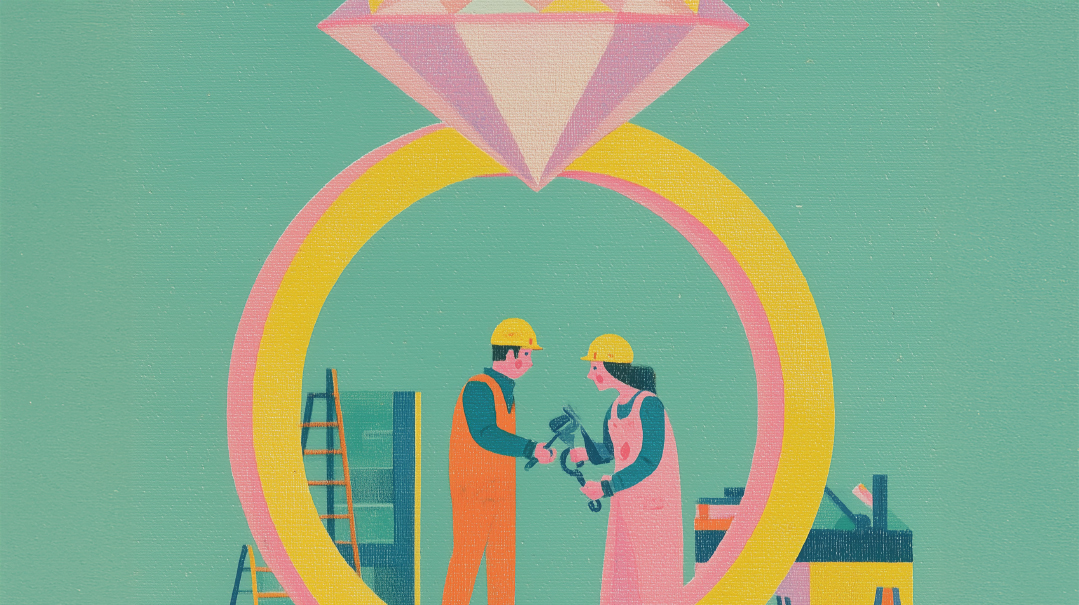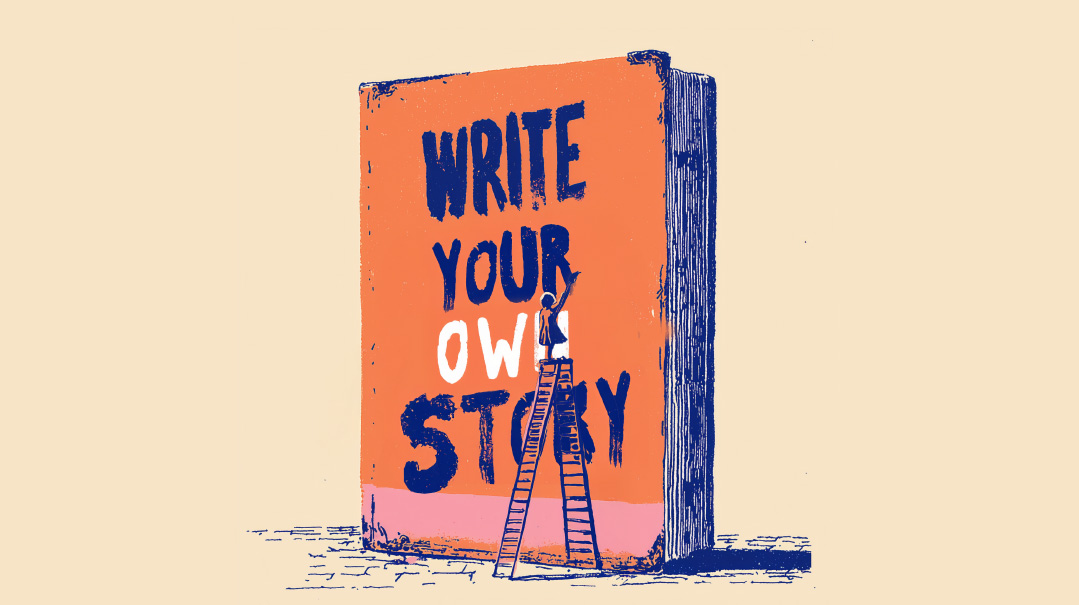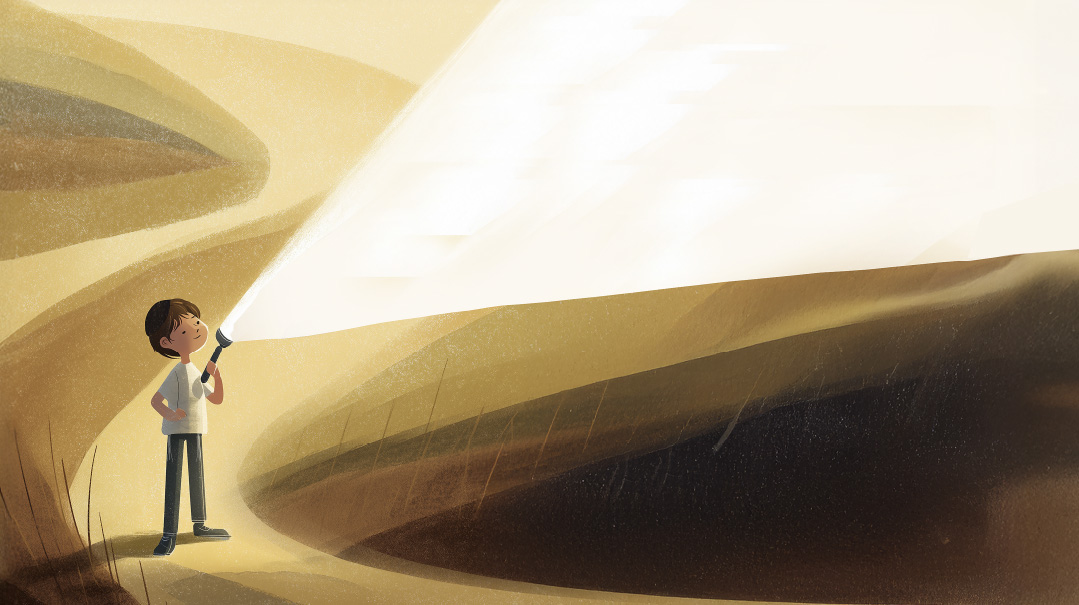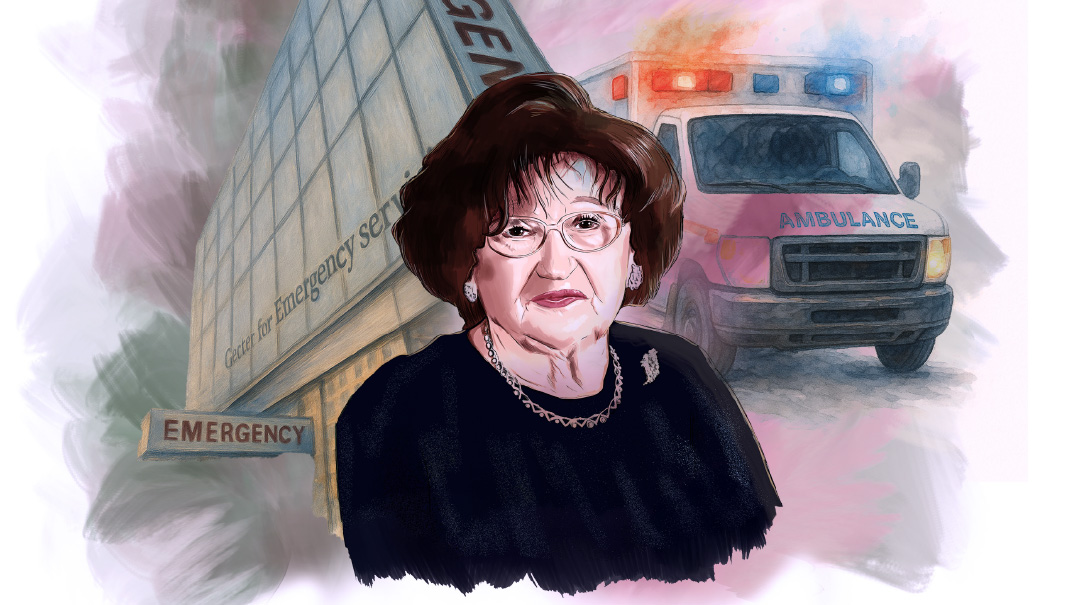Your Mother-in-Law Isn’t a Narcissist

There are paths that aren’t easy, but genuinely rewarding, for dealing with a difficult or hurtful family member

Chana’s mother is a difficult person. While her home looked functional on the surface, Chana and her siblings knew that something wasn’t quite right. Though their mother wasn’t the same as others’, as a child Chana had no vocabulary to articulate the difference.
“She was unpredictable; we never knew what would set her off,” she remembers.
Chana hoped no one would notice her mother’s peculiarities. “If my mother was screaming at my father while I had a friend over, we’d escape to my room, and I’d hope my friend didn’t hear. In my head, no one knew anything.”
As she matured, Chana was astonished when she overheard a neighbor comment, “Oh, the Cohens? The ones who are always fighting?” She’d never realized the dysfunction was apparent.
When Chana reached young adulthood, she began a journey of healing that helped her realize that some of her mother’s deficits had names. Though she still can’t point to a single root with precision, she’s learned that narcissistic personality disorder and depression may have contributed to her challenging upbringing.
As she teaches in seminaries and high schools, she’s learned she’s not the only one. She frequently hears her students complaining about the drama their toxic relatives cause.
Are there more difficult people in the world today than there once were? If you read a lot of self-help articles or hang out on social media or online support forums, it sometimes seems that way. Kvetch about feeling pressure from your mother-in-law, you’ll likely be told that she’s a narcissist. Had a fight with your husband? That behavior was seriously abusive.
What we may have forgotten, in our collective rush to judge, is that people are, well, people. And no matter how frustrating their flaws, or what they’ve been diagnosed with (or what you suspect they should be diagnosed with), you can still learn to navigate relationships with challenging people.
Cause for Concern
Our elevated awareness of psychological disturbances stems, in part, from a very healthy trend — the popularization of emotional knowledge and de-stigmatization of therapy. Now that our community has made such strides in the field of mental health awareness, it’s no longer embarrassing to attend therapy, and the language of psychology has slipped into our vernacular.
“Back in the olden days, he was a mechutzaf,” says Rabbi Doniel Frank, M. Ed, LMFT, licensed marriage and family therapist in Monsey, NY, “and all there was for us to do was to punish him. Today there’s an effort to understand the specific area of deficit that underlies the behavior and remediate it, rather than to simply write it off as a character defect.”
While understanding that someone struggles with ADHD might offer more insight than simply calling him a shlemazel, the rising awareness also buoys the popularity of such hyperbole as “I’m sooo depressed,” or “She was being totally OCD about it.”
This haphazard usage isn’t without risks. “Awareness without a factual checklist is dangerous ignorance,” says Dr. Shula Wittenstein, an individual and couples’ therapist practicing in Israel. “A teenager will gush, ‘She’s sooo anorexic.’ No, she’s not.
“Though teens have a tendency to speak casually, a responsible adult needs to understand that anorexia is a life-threatening illness with one of the worst mortality rates.” Failure to distinguish the real from the exaggerated muddies the waters, trivializing serious issues, preventing people from accessing the help they need, and causing us to claim pathology where none exists.
Helpful or Harmful?
“An actual personality disorder looks very different to the trained eye than a person who’s simply difficult,” says Dr. Wittenstein. A controlling parent, or one with poor boundaries who offers unsolicited child-rearing advice, isn’t clinically unwell, she says. While the former may be unpleasant to be around, growing up with a parent with a true personality disorder may make a child chronically confused: Are you good or bad? Safe or unsafe?
In general, a true disorder is far more pervasive than a difficult personality trait. The pathology presents in a wide variety of settings, typically impairs the sufferer’s functioning, and causes significant harm to valuable relationships.
“It’s a real disservice when people throw around psychological diagnoses,” she says. “It’s painful for people who actually suffer from these very real illnesses.”
Ariella, whose mother often expressed a wish that her daughter would kill herself, is taken aback when she hears people casually using clinical terms. “Sometimes people will kvetch, ‘My mom is such a narc, she doesn’t ask me how my day went,’” she marvels. “I’m not comparing issues — feeling unloved is always an insane pain — but be very careful how you use it.”
When you have a basically healthy, functioning person who’s just deficient in certain skills, she says, any kind of label is an opening to enable them to continue the unkind behavior. “Even if you’re just using the term to be offensive, it’s very unsafe. It gives them an excuse to keep on doing it.”
“Diagnoses are a double-edged sword, even within the industry,” says Rabbi Frank. When chinuch experts advise parents not to label children, it’s sound advice — even for professionals. “There’s only one reason to label someone, and that’s to understand what you’re dealing with, to define a set of tendencies — not to marginalize them.”
People are infinitely more complex than a pat label, says Rabbi Frank, and psychological diagnoses in particular are based on observed patterns. There are no concrete clinical tests like X-rays or CT scans; they therefore can sometimes be imprecise and shouldn’t box anyone, even a clinician, into a perception of a person.
“A diagnosis is meant to frame how you help the person and relate better to them. A diagnosis can be fluid and should never be used to marginalize and cancel someone. That’s a misuse and abuse.”
Dr. Wittenstein observes that for some clients an official diagnosis can be more disturbing than a description of their challenges. “We believe, in general, that information is power, but not everyone wants that,” she notes. “People often prefer to be ‘worried’ than to have an anxiety disorder.”
Recent research has begun to question the usefulness of diagnoses in treating mental health issues. Sometimes, an official diagnosis is necessary for insurance or medication purposes, but more often, a diagnosis is a helpful way to organize information and think about a set of problems. While the question is unlikely to be resolved soon, a thoughtful discussion between therapist and client about the benefits of a diagnosis in any given case is definitely warranted.
Esther’s in-laws have no official diagnosis, but she speculates that they might be on the spectrum and with possible narcissistic tendencies. Although her mother-in-law has always worked hard to provide for all the family’s physical needs, and fed and clothed them to perfection, she’s emotionally needy and constantly puts herself at the center of any situation.
“I don’t think a diagnosis would have changed anything,” says Esther matter-of-factly. “People are more complex than any one label. Suppose we got a ‘narcissistic personality disorder’ diagnosis. That wouldn’t describe a woman who forged through life and worked incredibly hard to provide for her children what she never received growing up. It would only be looking at the weakness that makes her so emotionally needy. In any case, it wouldn’t change our responsibility to be respectful.”
Ariella, in contrast, found that naming her mother’s behavior explained so much trauma she’d experienced as a child. When she’d cried that she wasn’t allowed to join certain family events, and her mother explained that it was because she loved Ariella’s brothers more; when she noticed there were framed portraits of all her siblings on the wall except her, she was sure there was something wrong with her, and that if she just managed to fix it, she’d be able to earn her mother’s love. Learning that her mother’s behavior had a name — borderline personality disorder — and that Ariella wasn’t intrinsically unworthy of love, was a relief. “I felt less crazy,” she says. Once she had a name, and along with it, an understanding of the underlying patterns, she was able to learn to respond in healthier ways.
While having a name for her experience was eye-opening and cathartic, Chana says, she is wary of viewing her mother solely through the lens of her disorder. It was important for her to process her experiences, but she makes sure to avoid easily-overused colloquial terms. “Calling them crazy usually backfires — you just shout and name call. It’s not a healthy way to view them,” she maintains. “As soon as you label something it comes out even more strongly. Your self-talk will come out.”
Positive, empowering messages about both you and the other person, says Chana, will bring more calm and communication into the relationship than mentally assigning a diagnosis, which will build impermeable walls. Chana likes to remind herself of the many ways her mother gave to her in her childhood, and quell the niggling voices that suggest that it was for purely selfish reasons. She also reminds herself that people are complex, and that all of us have flaws, and that’s okay.
In her work with college students, Chana has seen labels become a handicap in interpersonal relationships. “It’s like a get-out-of-jail-free card,” she says. Labeling themselves allows her students to excuse their poor behavior as something beyond their control, she says, and labeling others frees them of guilt or responsibility in holding up their end of the relationship.
Dr. Wittenstein agrees; casually labeling others’ less pleasant traits as a disorder reduces the relationship to a one-sided narrative with a perpetrator and a victim, thereby absolving the “victim” of any obligations. Why should I put up with her?
Why Bother?
Setting boundaries and working on accepting others’ flaws is hard work, as anyone who’s truly made the effort can attest. So why do it?
The question itself points to general growing tendencies toward self-orientation. In generations past, says Rabbi Frank, it was more of a given that some relationships would be more fraught than others. Today, in contrast, if a relationship takes more effort, he sees a much greater tendency to cut people off, a trend he chalks up to decreased resilience and a heightened expectation that life will be simple and pleasant, which was never a given the way it is today.
A popular expression Rabbi Frank particularly dislikes is “my truth.” People used to discuss their opinions, he says, not truths, and you were entitled to agree or disagree. Now, people claim their own truths, which denies you the right to disagree or challenge their assumptions. It’s an overall lack of perspective-taking, he says, and this lack of humility translates into less willingness to make hard relationships work.
But like many valuable endeavors, the effort required to maintain a relationship with a challenging acquaintance pays off in the long run — and often even in the short term.
“Why do we do it?” asks Esther. “I’m not sure why that’s a question. It’s in the Aseres Hadibros. It was quite difficult to keep Shabbos in early America too.” The Gemara is replete with stories of heroic efforts to respect parents even in the face of difficulty, such as the case of Dama ben Nesina, who allowed his mother to publicly humiliate him.
Dama, according to Chazal, was a non-Jew, which Esther says highlights a critical point: to parents, in particular, we have an innate, human obligation of gratitude. One of the biggest blessings Esther’s decision has afforded her is inner peace. “My father-in-law passed away this year,” she confides. “The sibling who cut off from the family is experiencing a very complex grief. The others have all grown from their experiences and become greater people.”
While everyone’s situation is of course unique, in her own family she attests that the siblings who put in the effort to work with their challenging parents have all come to terms with the situation, while the ones who chose to cut off ties have many challenging family issues of their own. “They don’t have an easier life — they have different problems,” she says, while she herself sleeps well at night, knowing she’s taken the high road.
Like many people with challenging family members, Chana feels that the pain of a severed relationship is worse than the pain of dealing with it. “It’s a huge hole, developmentally, if someone has to cut off a parent.” She feels that the effort to learn coping tools, enormous though it is, is worth it to salvage a precious relationship, and affords life skills that spill over into every area of mental and emotional health.
Ariella likewise says that the growth engendered by learning to work with her difficult mother, rather than shutting her out, has been life-changing, and she wouldn’t trade it for anything. “When people say, ‘Don’t talk to her, she doesn’t deserve to be in your life,’ that’s making me less mature, less healthy, and training me that if something isn’t comfortable, it doesn’t belong in my life,” she says. “That ruins a person. You become the narcissist. Why stoop to that level?”
While safety comes first and should be assessed with a competent professional (see sidebar), putting your own desire for comfort ahead of the mutual desire for a relationship is a form of selfish behavior, she says, and selflessness is key to emotional health. Today, Ariella can navigate the rocky relationship in a way that’s safe for her mental health, even though it’s not, and never will be, comfortable.
There’s no escaping difficult people, and learning to deal with them offers global rewards. Ariella observed that even when some of her siblings tried to distance themselves from her mother, they couldn’t escape the reality of a fractured family. Every simchah, every birthday party would become a delicate dance of who was coming and who wasn’t, and trying to predict and control what would happen.
Since there was no way to stay part of her extended family without dealing with her mother frequently, Ariella realized that it was up to her to change the dynamic. “I realized I just needed to work on myself. Okay, so she’ll make a scene. But I need to learn how to deal with unhealthy people.”
Chana concurs. In a lecture by Mrs. Dina Schoonmaker, she heard the idea that everyone has one or more difficult people in their lives. The difficulty isn’t caused by that particular person, she relates; it’s a difficulty you need to work on, and it manifests itself in the context of that relationship. But if you don’t do the inner work you need for your emotional health, hiding won’t help — that difficulty will manifest itself elsewhere.
Still, there are definitely dynamics that are so chaotic or even abusive that it would be very difficult to salvage the relationship. While in her experience, these are a very small minority, says Dr. Wittenstein, they do exist, and should be evaluated with both daas Torah and a competent mental health professional, ideally working as a team. The cases she’s seen that needed to totally sever a close relationship were those that took a serious physical or emotional toll on her client’s health, or threatened the stability of a marriage. Most other cases, she feels, can be managed with very careful boundaries.
Making it Work
To succeed in a battle, tactics and weapons alone aren’t enough; a soldier needs a mission. “You have to start with an attitude that your goal is to make this work. There is NO other option,” says Esther. With that out of the way, you can focus on tips and techniques.
Often, physical distance helps. In extreme cases, if it’s possible to move out of town, or at least to a different area — this can help an adult child maintain a respectful relationship without feeling like he’s drowning, says Esther. Although it was difficult for her husband to uproot himself and find a new place, they felt it was a sacrifice worth making to be able to maintain a relationship with his parents.
In smaller scale conflicts, consider sleeping by a neighbor when you go to the in-laws for Shabbos or keep phone calls brief. Even small tweaks to the physical environment can smooth over a difficult dynamic.
Next, getting on the same page as your spouse is crucial. “I tell my children the mashal of the professor who asked his class to fill a jar with rocks, pebbles, and sand,” says Esther. “If you start with the sand, nothing else will fit, but if you start with the large rocks, everything else can fit into the cracks. If your spouse knows that they’re number one, there will be room for your parents too.”
Whenever Chana and her husband head to her hometown for a visit, they remind each other that they’re on the same team, and that the difficult family dynamics don’t have to come between them. “My mother can be yelling at us, but we don’t have to yell at each other,” Chana says.
Widening the circle, supportive friends and family can make all the difference. “My brother will call me and role-play,” says Chana. “‘This is what mommy will say.’ We’ll picture it, visualize it, prepare ourselves. It brings acceptance — she will say it. I don’t have to let it bother me. And often, after preparing that way, I’ll be pleasantly surprised, like I’d expected five negative comments and got only three.”
“Know yourself and use whatever resources you need,” agrees Esther. “It’s fine to cry. One sister-in-law goes to therapy whenever she gets too overwhelmed. Another has a cadre of very close friends who commiserate with her and provide the outlet she needs to grin and be the most dedicated daughter for another day.”
Therapy has been valuable for Chana, too. In particular, the concepts of Internal Family Systems, which emphasizes the multiple components that make up every individual, taught her to understand her mother’s complexity. While it had always been tempting to see even her mother’s positive traits — her dedicated mothering, her chesed, her work ethic — through the lens of her overbearing ego, Chana learned instead to see her as a three-dimensional person with flawed aspects, which gave her a newfound appreciation of her mother.
Esther applied a similar idea on her own. She taught herself to separate her own insecurities (her total lack of kitchen skills as a newlywed) from her mother-in-law’s shortcomings (a propensity to offer unsolicited advice and stinging criticism). Once she was able to define her own boundaries — what role do I play in this dynamic? What can I take responsibility for? — she was able to consider the root of the behavior.
Her mantra was “hurt people hurt people,” and she considered the source of her mother-in-law’s pain. In this case, she realized that her mother-in-law was struggling with giving up the role of nurturing her son and taking care of all his needs. With this insight, Esther found the compassion to call her mother-in-law for advice and recipes, which in turn bolstered her mother-in-law’s dignity and softened her harsh tone considerably.
“It’s about what Pirkei Avos says — judge the whole person favorably,” she says. “They may be doing something wrong. But where is it coming from? Feel their pain. Understand their life. It may not make what they’re doing okay, but it gives you a different perspective.”
For Ariella, the healing came through inner child work. When she realized, by reading and talking to mental health professionals, that it was her own past wounds that were triggered by her mother’s challenging behaviors, she learned to give herself what she needed in order to heal from the inside. She focused on giving herself the love she never received, and allowing herself to feel the emotions that had been off limits while growing up.
The common denominator, which can often be applied without professional help, is seeing what improvements you can make to your own emotional well-being to avoid being triggered by others’ behavior.
Above all, says Esther, understanding that Hashem has given us these people in our lives can help refocus us on the task of building bridges, instead of on nursing our wounds. Hashem knows what He’s doing and is challenging us in a way that will stretch us and build us. In fact, she even experienced a self-centered flicker of worry after her father-in-law’s petirah. “Where will we get the zechuyos we need to marry off the rest of our kids?” she remembers wondering. Keeping personal growth at the forefront can help us take the high road in rocky relationships.
Looking Within
The extent to which we are expected to exert ourselves to repair fraught relationships is illustrated by Moshe during Korach’s rebellion, says Rabbi Frank. Despite the serious challenge to Moshe’s G-d-given authority, he repeatedly attempted to reach out and repair the rift, first speaking respectfully to Korach, and then calling on Dassan and Aviram to hear them out. Only when Dassan and Aviram flatly refused any dialogue did Moshe appeal to Hashem to intervene.
Years ago, Rabbi Frank posed a delicate sh’eilah to his rosh yeshivah, Rav Yaakov Weinberg ztz”l. A friend needed to understand whether to end a relationship with an extremely difficult parent who was making very bad choices.
In the course of the discussion, one of the participants cited the midrash that faults Yaakov Avinu for hiding Dina from his brother Eisav. Should Yaakov really have married off his daughter to that quintessential rasha?
Of course not, said Rav Weinberg, but he was expected to keep the door open, and not shut down any possibility of a future reconciliation, should Eisav mend his ways.
Similarly, when dealing with the difficult people in our lives — especially family, and especially those who are doing the best they know how — the end goal should never be to terminate the relationship. Even when boundaries do need to be sensitively drawn, the goal is always to achieve connection and get to dialogue.
“Difficult is a human condition,” says Dr. Wittenstein; we all fall prey to it at least some of the time. While you find someone’s constant gloom upsetting, your perpetual cheeriness might be grating on her nerves.
“But he’s objectively difficult!” you find yourself protesting. Even so, says Dr. Wittenstein, there are few cases where you can’t find some way to make the relationship work. Remembering that all of us, no matter how emotionally healthy we are (or aren’t), are all difficult at least sometimes to some people, can inspire compassion and a plea for understanding of all types of people.
*All names in personal examples have been changed
The View from the Rabbi’s study
Rav Noach Isaac Oelbaum is the mara d’asra of Khal Nachlas Yitzchok in Queens, NY. He offered his perspective on this issue.
The dismissive attitude we see so frequently today toward the older generations is something that would have been unthinkable a few decades ago. Our communities have always respected parents and grandparents. Unfortunately, as in many areas of life, secular values and mores have crept into our society, watering down the esteem we’ve traditionally held our elders in, and allowing young people to judge their elders.
It shouldn’t come as a surprise, since the Gemara tells us that in the times before Mashiach, young people will rise up against the old.
Even more painfully, children sometimes use their parents’ emotional shortcomings as a reason for cutting off relationships with their parents. Only the very rarest cases — cases of genuine abuse and pikuach nefesh — may warrant a complete cutting off of ties. In almost every other case, there are ways to still maintain a civil, working relationship, even if it can’t be a close, warm one.
The Gemara has numerous examples of the extent to which we need to honor parents, even when their behavior is unhealthy. But most people don’t have the tools to navigate such a hard relationship on their own. Just like you wouldn’t figure out how to deal with a broken leg on your own, don’t try to diagnose or handle emotional illness on your own.
When dealing with difficult people, whether parents or others, it’s important to turn to someone with experience for guidance, whether that’s a frum, competent therapist, or a rav with experience in this area. They can help you find the balance that can keep the relationship alive, but at a safe distance.
Perhaps calling instead of visiting can work; perhaps it’s a question of showing interest in the other party’s life without disclosing much about your own. There are answers and workable solutions to most difficult relationship questions.
The most important thing is not to act impulsively in the heat of emotion. People often make the mistake of cutting off relationships, thinking that will give things time to cool down, when really it just allows the hurt to fester. By all means, set healthy boundaries, but do it with calm reflection and with the help of an experienced, objective guide.
Me Generation or We Generation?
Bemoaning the state of today’s youth is practically the national pastime of adults who are middle-aged and older. Is there a factual basis to all the hand-wringing?
In The Narcissism Epidemic, research psychologists Keith Campbell and Jean M. Twenge make the case that the average personality profile in the US has been becoming steadily more narcissistic over recent decades. Through meta-analyses of thousands of questionnaires administered to successive generations of college students, they argue that American culture is degenerating into a selfish morass, with the problem growing faster than obesity rates.
They point to an educational culture that idolizes self-esteem, and pervasive media influence that promotes attention, views, and likes as the measure of success, as driving forces in this crisis of personality. The United States is exporting this mindset to the rest of the world, and it’s affecting areas as disparate as the credit market and the demand for cosmetic surgery.
Popular culture and armchair psychologists have latched onto this trend with enthusiasm. In an echo chamber of support that essayist Kristin Dombek has dubbed the “narcosphere,” pop psychology writers, celebrity pundits, self-proclaimed life coaches, and thousands (millions?) of unhappy lay people exhibit a greater preoccupation than ever before with measuring and analyzing the personalities of their family and friends. Bad behavior is immediately called out, labeled, and its victims are encouraged to go “no contact.”
However, other experts in the field disagree with Twenge’s and Campbell’s findings. Their criticisms range from the methodology used, to the subjects of the research (almost all college students at specific universities, who may not accurately represent a cross-section of the population), to the interpretation of the data.
One outspoken critic, psychologist Dr. Jeffrey Jensen Arnett, notes that many measures of unselfish behavior actually show promising trends. Volunteerism is up, crime rates and incidence of other risky teen behavior are down, and today’s young people are the least racist or discriminatory that have ever existed.
Are there more difficult people around today? That remains unclear, but labeling a generation as selfish, argues Dr. Arnett, is a surefire way to create more of them.
(Originally featured in Family First, Issue 775)
Oops! We could not locate your form.







